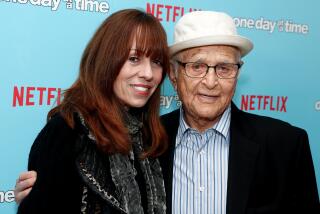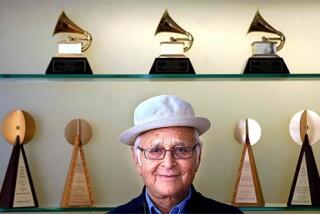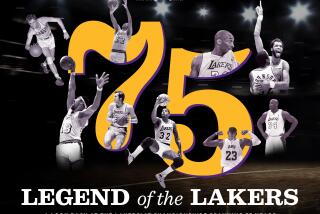Freddie Laker, 83; Englishman Pioneered Low-Cost Air Travel
Freddie Laker, the ebullient English entrepreneur who pioneered low-cost air travel, helping a generation of ordinary Britons visit the U.S., has died. He was 83.
Laker died Thursday at a hospital in Hollywood, Fla. He had been ailing recently and had undergone two heart surgeries, said his son, Freddie Jr.
The self-made millionaire inspired two generations of businesspeople to take on the entrenched aviation giants. He struggled for more than 10 years against the monolithic airline industry and the government bureaucrats who protected it, finally getting Laker Airways’ transatlantic Skytrain flights aloft in 1977. The airline charged New Yorkers as little as $135 one-way to fly to Britain.
“He was the first with the budget airline concept, especially internationally,” said Robert Grant, a business professor at Georgetown University in Washington, D.C. “When Richard Branson wanted to start Virgin, Freddie Laker was one of the first people he talked to.”
Branson became a family friend and called as often as twice a day to ask for help.
“Perhaps his best advice was to make sure that I took British Airways to court before they bankrupted us -- not after, as he did,” Virgin Airways founder Branson said in a statement.
Laker Airways collapsed into bankruptcy in 1982, and the causes of its demise are still debated. Among the no-frills successors are some of the most profitable airlines of recent years, such as Southwest Airlines Co.
Laker returned in 1995 with a slimmed-down airline that offered twice-weekly service between Florida and London. Before it ceased operations in 2004, the carrier had been reduced to providing service between the United States and the Bahamas.
Laker had problems with what he saw as bigger carriers’ bad business practices, not necessarily with their frills. The new Laker airline began giving free alcohol and other amenities to passengers. And Laker himself drove Rolls-Royces as well as a beat-up Nissan.
“The only reason he was in the airline industry was so he could buy boats,” Laker’s son, Freddie Jr., said in an interview Friday.
The elder Laker had been living in the Bahamas and piloted his own yacht until age 80. He kept so active in retirement that his family, following a long-standing joke, plans to cremate Laker along with his cellphone.
Laker was brought up in a coldwater flat by a single mother in Canterbury. He said he decided he wanted to fly when, as a teenager, he saw the Hindenburg airship in flight.
“Even now, I can see it,” Laker recalled in 1995. “I said to the other yobs: ‘I’m going into airplanes.’ ”
Laker started out sweeping floors and making tea at an aircraft factory, learned engineering and then struck out on his own, making deals to fly cargo. His first major break came after he volunteered to help with the Berlin airlift of 1948.
Leading a merged group of small airlines starting in the 1950s, Laker saw how companies worked together to keep prices high.
In starting Laker Airways in the mid-1960s, he used grit and wit to get around the rules that protected major carriers. Because discounted prices were for a time allowed only to members of special-interest groups, he flew passengers as newly inaugurated members of the Right Wheel Group and the Left Wing Club.
“He knew how overinflated it was,” his son said. “He broke the regulation.”
Laker had a love of business so deep that he read financial statements to 10-year-old Freddie Jr. rather than play ball. Yet Laker kept a common touch, happy to help load baggage if staffing was short.
U.S. authorities stalled Laker from crossing the Atlantic for years, worried about harm to major domestic carriers. Laker eventually bested them as well. He began flights to Los Angeles in 1978, priced as little as $220.
“He was up against an evil cartel in many ways,” Grant of Georgetown said. “The fact that he was able to win, by sheer force of personality, is a tribute to his strength of character.”
The company battled price-cutting by wealthier rivals, but a decline in British currency, among other factors, finally did him in. The 1982 bankruptcy stranded passengers when the Laker planes were recalled.
His claims of conspiracy were largely borne out by later litigation, which showed that the major airlines had harassed DC-10 manufacturer McDonnell Douglas after it agreed to help refinance the ailing Laker Airways. Eventually, the other airlines settled by paying millions of dollars, most of it to Laker’s creditors.
Laker’s fight paved the way for industry deregulation and brought him a knighthood. His effort “has been part of the global revolution in communications and certainly has made it possible for thousands upon thousands of British people to come to the U.S.,” said Angus MacKay, spokesman for the British Consulate in Los Angeles.
In addition to his son, Laker is survived by his fourth wife, Jacqueline, and daughter Elaine.
Services will be held in south Florida, on Grand Bahama Island and in England.
More to Read
Inside the business of entertainment
The Wide Shot brings you news, analysis and insights on everything from streaming wars to production — and what it all means for the future.
You may occasionally receive promotional content from the Los Angeles Times.










